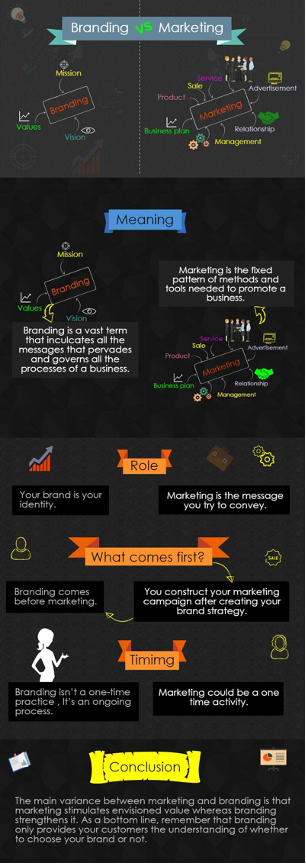Top 6 Key Differences Branding vs Marketing | Companies | Strategy | Management.
All About the branding vs marketing
Branding vs Marketing – The main difference between Branding vs Marketing is the same as between the moon and the sun. Marketing is the fixed pattern of methods and tools needed to promote a business.
Branding vs Marketing may include one or all of SEO, PPC, social media, mobile, local search or even the traditional tools and practices. On the other hand, Branding is a vast term that inculcates all the messages that pervade and governs all the processes of a business.
The sun is the solitary source of all light, warmth, and life. It makes other living beings grow. It is the reason for the existence of all life on the Earth. This is what your brand is.
Moon is a pretty rock that revolves around the planet and reflects the sun’s light. This is branding and marketing management. Get your marketing right and it significantly lifts your chances of acquiring more customers than the competitors.
Failing to do so would land you up in trouble and eventually, you will be thrown out of the market.
Branding vs Marketing Infographics
Below infographics on Branding vs Marketing list some of the key difference between the two.

Branding vs Marketing – Key Differences
In layman terms there are six broad points to make us understand the difference between branding vs marketing: –
Marketing is the message you try to convey. Your brand is your identity.
Howard Schultz has rightly put it into this – “Authentic brands don’t emerge from marketing cubicles or advertising agencies. They emanate from everything the company does.”
Your brand is the reason for your existence. It is the authentic, unique and singular value you can offer to the customers.
It includes the culture of your company and is conversed to the customers each time they get involved with your brand. On the other hand, branding and marketing management is just the message conveyed across to them.
Branding comes before marketing.
Merely having a possession of logos, package designs and a slogan does not mean you have a brand. What you actually own is a set of marketing ingredients and messages.
This is how Peter Getman of MicroArts puts it into – “Whether they forget or purposely neglect it, many blows off step one of the branding processes.” So, now you must have started to ponder – “What is the step one”? Here is what it is.
It is the process of determining and defining your brand’s worth in the industry. Once you have looked after this process, you can choose to develop your branding and marketing strategy and lastly construct your marketing campaign.
You are the owner of your marketing, but consumers are the owner of your brand.
This is easier to understand and control as compared to branding. Branding is, however, not as simple and easy as it seems.
There are some aspects such as marketing and customer service that have a role to play in your brand but you cannot create your brand value without using such vital aspects.
According to Peter Getman –“Your brand is not your idea. Surprisingly, many executives believe they can control how their brand is perceived by the masses of consumers. They cannot. “
It is very important to understand the key differences between branding vs marketing and never get confused with any of them.
One of them is that while marketing is storytelling, branding involves more listening than talking. Consumers can better tell you what your brand is and how it should be as they actually know better than you do.
The best brands in the world are those that use their comprehension of the differences between branding vs marketing to create such market campaigns that work in unison with their branding and marketing strategy.
Such brands always listen to their customers and allow their expectations and values to define their brand’s standing. Later, they construct market campaigns to convey those values through simple and unique methods.
This may provide an addition to a brand, but the brand is larger than any marketing activity. The brand is what is left behind after marketing has swept the place.
The brand is what sticks to your conscience after you come across it through any marketing or non-marketing campaign. It may not necessarily mean that you have tried or bought the product (or service) at that moment.
This does play a part in influencing the customer to buy your product, but it is really the brand which determines the true loyalty of customers. A brand is made up of many components and the lived experience is one of the major ones.
“Marketing discovers and stimulates buyers. Branding makes devoted customers, supporters and even evangelists out of them.”
The same common principle applies to all types of firms and organizations. There is a saying that “All organizations must sell.” How they sell is a different issue, and every staff member of the brand either does contribute to it or causes harm.
Your every thought, every policy, every action, every ad has an impact on the brand loyalty of whomsoever is visible to it. There is an effect on sales caused by such actions.
Talking of the financial aspect, marketing is a cost center. Having said that, ill-researched and implemented marketing activities can make it look like a cost center but a well-constructed marketing campaign works like an investment that pays for itself in sales and brand fortification.
Now, let us know whether branding is a cost center or not? Same again, on the exterior yes, it is a cost center. But, loyalty is the return which you get for it.
Isn’t it a cheap cost center? Return in terms of hardworking and self-motivated employees, and super loyal customers who act like advocates and ambassadors for the company.
“Branding is as important to the success of a firm or a non-profit as having financial lucidity, having awareness for the future along with quality personnel.”
Branding is the vital substance for a prosperous action. Initially, it may seem a cost center like any effective employees, business innovators or financial experts are, but what is costly is to escape it or have a substandard one.
Wherever Marketing Ends, Branding Arises!
Branding is a Promise Delivered!
Robert Bean of Northstar Partners has given a wonderful definition of a brand; he says that brand is a “promise delivered.”
This is such a meaningful definition as it emphasizes that every brand owner makes certain promises to their customers, and to be successful in real terms they must deliver on those promises on every occasion.
Those who think that brand is merely a name, color or badge are actually far away from the reality. A brand is everything and anything within a company.
The purpose of a brand is to know your target audience, their wishes, and desires of the company and make them understand why you are better for them instead of your competitors.
Some firms that are small in stature mostly do know their goals and objectives and as long as they remain small with relatively the same employees then they need not go over this exercise again.
However, with most other firms things do change a little. Changes can be in the form of a sales drop or threat by a competitor. So, how to react in such a situation?
The answer is if you have already defined your brand, things could and most probably would turn in your favor. You would be able to overcome issues such as employee hiring, what to sell, how to communicate with the customers and even design the layout of your office.
The real key to devising an effective and long lasting branding and marketing strategy is to get the employees involved in the process as much as you can. You must also hire a brand expert to help you and guide you through the entire phase.
This need not be a very expensive or a time-consuming process, but once done could make your brand flourish and prosper for years to come.
Then what about Marketing?
The Chartered Institute of Marketing has defined Marketing as “The management process responsible for identifying, anticipating and satisfying customer requirements profitably.”
Marketing thus is a central part of any brand. It is an effective medium to communicate the promises that you wish to convey them about.
Even your marketing should be based on your brand’s identity, values, positioning and pitch of voice that have all been pre-discussed and communicated amongst the employees.
In quintessence, this is the activity of getting your promise or a message across to the customers, whilst branding is the action of keeping up with those promises by way of delivery to customers and employees.
What is Marketing? What is Branding? How do you differentiate between branding vs marketing?
Although there is a gamut of beliefs on this topic in my own view, marketing is the active promotion of a product or a service. It is really a push method.
It is pushing out a view in order to achieve the desired result: sales in our case. It is the aggressive persuasion to your customers and by any means possible that your product and your product only (or service) is the best choice they can opt for.
It may sound over simplistic, but that is what it really is. However, branding is different.
Branding should both trigger and precede any marketing activity. Branding is not a push tactic rather it’s a pull tactic. Branding involves communicating it to the customers about your attributes, values, and characteristics of your own brand.
Yes, the brand actively supports the marketing efforts in that it guides a consumer to buy your product but it does not explicitly say, “buy me”, instead it says, “This is me. This is the reason for my existence. If you like me, you can buy be and recommend to your friends.”
A Few Fallacies about Branding
Deeming branding vs marketing as one is the most common fallacy regarding branding that we come across. Several marketers and businesses that look after branding activities also make the following fallacies:
Fallacy #1: Branding is promotion/ marketing/advertising /or anything related to that.
As stated earlier, this is a misapprehension since branding is a much deeper philosophy than marketing. Marketing, promotion, and other advertising actions only convey your message and brand personality.
Your brand is encompassed by your character, your expression, and your message. Branding is the practice of instituting such characters.
Fallacy #2: You are the final expert when your brand is in question.
This is a very usual fallacy, found particularly among the newbies in business. In fact, it is no doubt you who has started the brand and launched all formal activity related to its operation including the employees, but still, it does not make you the supreme in-charge of the brand authority.
It is, in fact, your customers who finally describe your brand. Remember, the customer is the king! It is their opinion about your brand which sticks with other people whom they inspire.
That is why it’s said that “choose your brand values very carefully.” If you select poor values, your brand’s image goes very negative all around, or worse your brand may flop if the repeat customers do not show up.
Fallacy #3: Branding does possess a formula for success.
Let us make it clean and clear; there is not any formula or shortcut for success even in online marketing. In addition, remember no two branding and marketing companies can be exactly similar. Every branding and marketing companies have their own unique set of needs and characteristics even if they operate in the same domain.
So, accept the truth that there exists no fixed formula for success in branding. It will constantly remain a personalized experience.
However, the bright side is that you can always calculate the relative success of the brand quite easily. For this, you must measure the interests and the preferences of your target customers.
Conclusion – Branding vs Marketing
The main differences between branding and marketing management are that marketing stimulates envisioned value whereas branding strengthens it. If you begin with a substandard service, your marketing would assist you in making a sale, but your branding would enhance the notion that your service is substandard.
As a bottom line, remember that branding only provides your customers the understanding of whether to choose your brand or not.
A very crucial point to be kept in mind is that branding isn’t a one-time practice that you need to do only at the beginning. It is an ongoing process that pervades your methods, your philosophy, and most importantly your progression as an organization.
It also requires a great deal of commitment and loyalty which should echo in your efforts. Finally, every business wants to acquire as many customers as they can and earn a decent amount of profits. And, this is the measure of the success of your brand as well.





